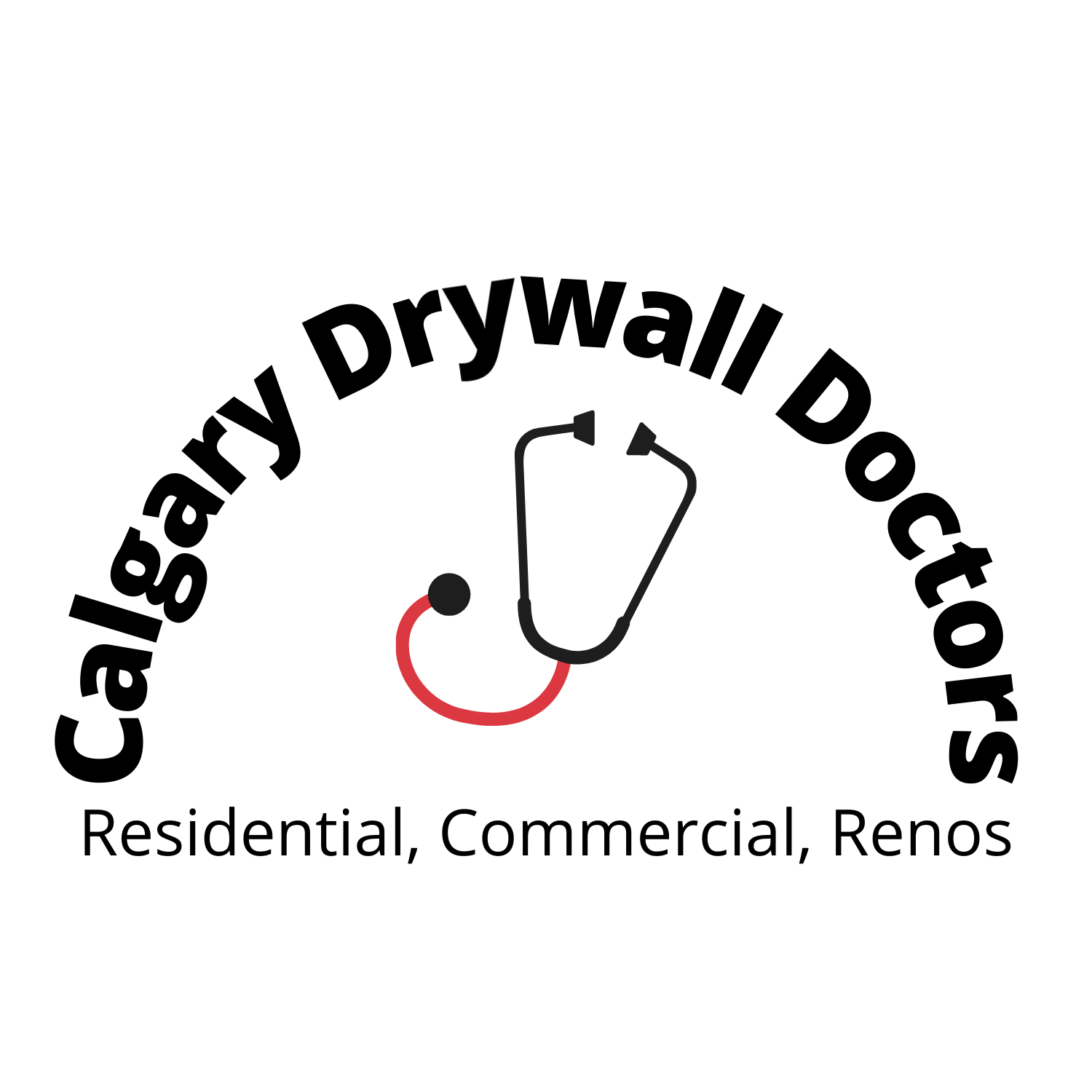Calculate your total square footage initially, then research current material costs, which range from $10-60 per sheet depending on type. You’ll need to assess local labor rates ($1-3 per square foot) and factor in project complexity like ceiling height and access issues. Get multiple contractor quotes, account for finishing costs, and set aside 10-20% for contingencies. Following these seven critical steps will help you develop an extensive cost estimate that protects your budget.
Key Takeaways
- Calculate total square footage of walls and ceilings, then add 10% extra for waste and mistakes when estimating material needs.
- Research current material costs, considering standard panels ($10-20) versus specialty options like moisture-resistant or soundproof drywall.
- Get multiple contractor quotes, as labor rates vary from $1-3 per square foot and $50-100 per hour depending on location.
- Factor in project complexity, such as ceiling height and access issues, which can increase costs by 10-30%.
- Set aside 10-20% of total budget for contingency to cover unexpected expenses during installation.
Calculate Total Square Footage Accurately
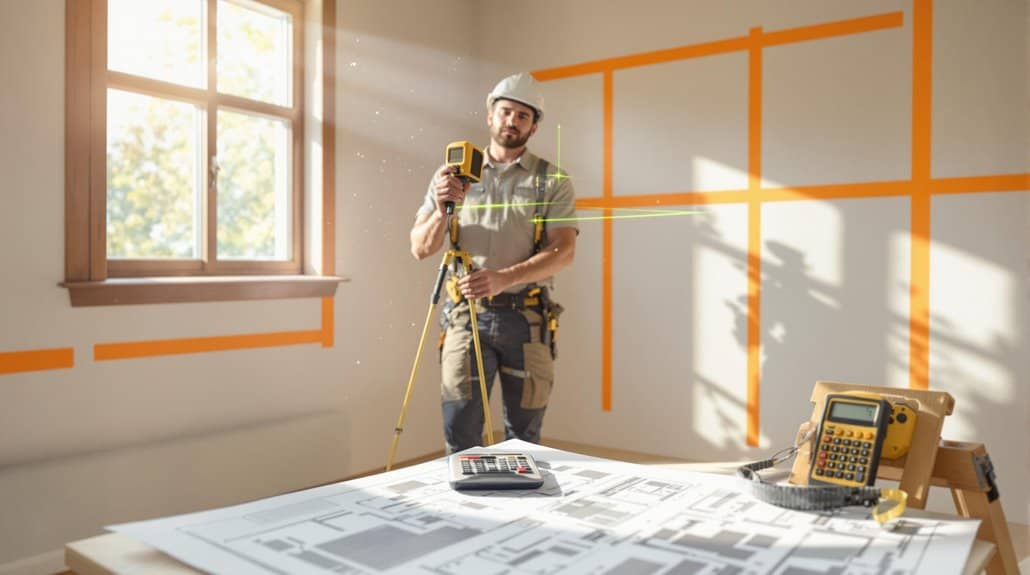
Before starting any drywall project, accurately calculating the total square footage is essential for estimating costs and materials needed. To measure the square footage, multiply the width and height of each wall and ceiling surface, then combine these measurements together for an accurate estimate of the total area.
You’ll need to factor in drywall sheets, which typically cover 32 to 48 square feet each, to determine material costs. Don’t forget to include an extra 10% in material calculations to account for waste removal and potential mistakes during the installation process. For repair projects, you can focus solely on measuring the specific areas that need attention. This precise approach to calculating total square footage helps you better understand average costs and avoid unexpected expenses during your drywall installation. Considering that basic drywall installation costs between $1.50 to $3.50 per square foot in Calgary, accurate measurements are crucial for proper budgeting.
Research Current Material Price Points
Understanding current material costs is vital for accurate drywall project estimates. You’ll find standard drywall panels ranging from $10 to $20 per 48-foot sheet, while specialty options like moisture-resistant and fire-rated materials can reach $60 per sheet.
When calculating your project’s material costs, consider that soundproof drywall panels cost between $1.85 and $3.00 per square foot. Factor in the average installation cost of $1.50 to $3.50 per square foot, which varies based on project complexity. You’ll want to research bulk pricing options for standard drywall, as this can greatly reduce your total expenses. Keep in mind that material prices fluctuate with market demand, so it’s vital to verify current rates before finalizing your estimate. This attention to detail guarantees you’re working with accurate, up-to-date pricing information. Geographical location significantly impacts overall costs, with urban areas typically commanding higher prices for both materials and labor.
Assess Labor Rates in Your Local Market
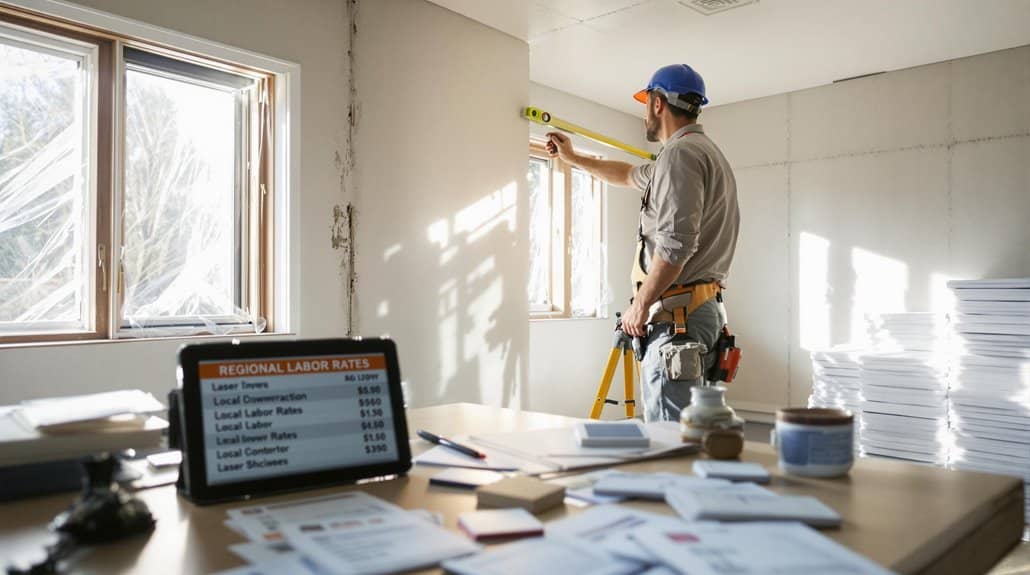
Construction professionals closely monitor local labor rates when estimating drywall installation costs. Understanding your local market helps you assess whether quoted prices align with regional averages. Labor costs typically fluctuate based on location, with urban areas commanding higher rates than rural locations.
- Average cost ranges from $1.00 to $3.00 per square foot, varying by contractor experience
- Seasonal demand affects pricing, with peak construction periods driving rates higher
- Professional contractors charge between $50 and $100 per hour based on expertise
- Multiple quotes help establish fair market value in your area
To estimate labor costs accurately, consider requesting quotes from several contractors during off-peak seasons. Keep in mind that prices in your local market may differ from national averages due to regional economic factors and contractor availability. This research guarantees you’re well-informed when budgeting for your drywall installation project. Companies like Calgary Drywall Doctors prioritize quality and reliability while maintaining competitive market rates.
Factor in Project Complexity and Access
When evaluating drywall installation costs, you’ll need to account for project complexity and site accessibility factors that can greatly impact your budget. Installers may charge 10-30% more for intricate designs or custom textures, while access issues like narrow hallways can increase labor costs by 15-25%.
To accurately estimate your project costs, consider ceiling height requirements, as rooms exceeding 9 feet will require extra safety equipment. Working in tight spaces often demands specialized equipment like scaffolding, adding $100-$300 to your total project expense. Don’t overlook site preparation needs, such as old drywall removal or structural repairs, which can increase cost factors by 5-15%. Understanding these complexity-driven variables will help you develop a more precise budget and align expectations with your chosen contractor. Exploring bulk purchase deals through local suppliers can help offset some of these additional complexity-related expenses.
Account for Additional Finishing Costs
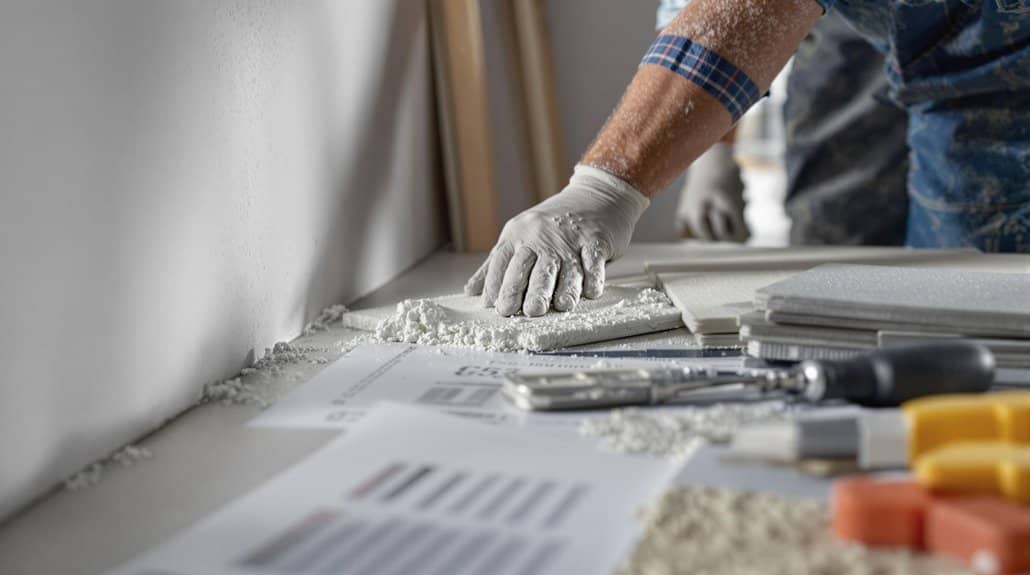
To accurately budget your drywall project, you’ll need to include essential finishing costs that extend beyond basic installation. Understanding the average cost to install drywall includes considering multiple finishing stages and supplementary services that affect your total estimate.
- Drywall finishing, including taping and mudding, typically costs between $0.90 and $2.00 per square foot
- Texturing and specialized finishes can add $0.50 to $2.50 per square foot to your project
- Painting services generally range from $1.50 to $3.50 per square foot
- Custom finishes and intricate designs may require higher labor costs
When determining your level of finish, consider factors like moisture resistance and aesthetic requirements. While basic finishing might suffice for some areas, specialized textures or custom finishes will impact your bottom line. Be sure to discuss these options with your contractor to align with both your vision and budget.
Working with skilled professionals can help prevent costly mistakes that often result from DIY installation attempts.
Compare Multiple Contractor Quotes
Before finalizing your drywall installation budget, gathering multiple contractor quotes serves as a crucial step in securing the best value for your project. You’ll want to obtain 3-5 estimates from different drywall contractors to effectively compare materials and labor costs.
When you compare multiple contractor quotes, examine the breakdown of included services. Evaluate each contractor’s experience level and reputation alongside their pricing. While it’s tempting to choose the lowest bid, be wary of estimates that seem unusually low or high for your drywall project. Keep in mind that experienced contractors might charge more per hour but often complete work more efficiently. Focus on finding the right balance between cost and quality of materials and workmanship. Consider that a slightly higher quote from a reputable contractor could save you money through superior installation and fewer future repairs. Many professional contractors like Montgomery offer free consultations to thoroughly assess your drywall needs and provide detailed estimates.
Plan for Unexpected Expenses and Contingencies
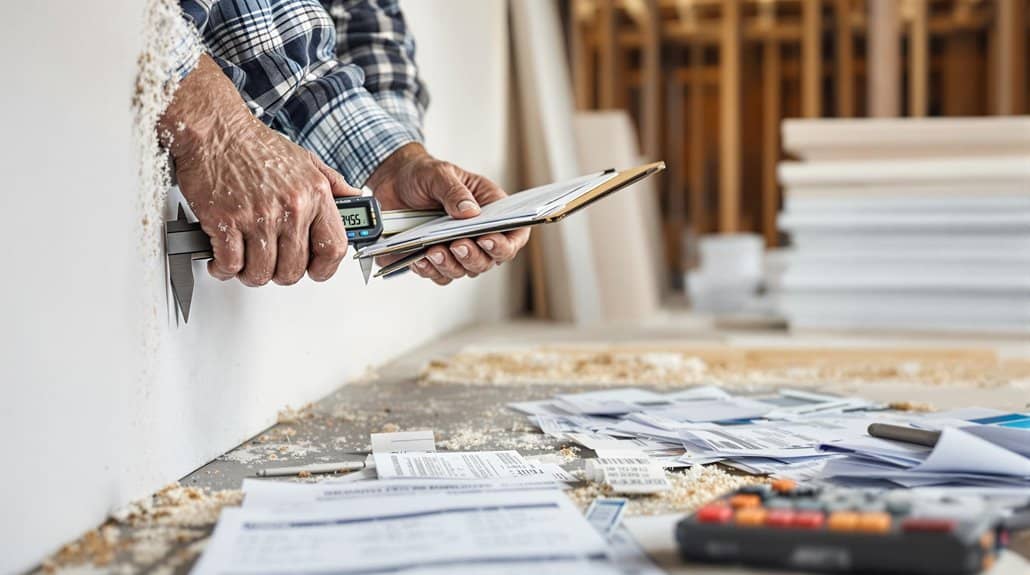
Even with careful planning and multiple contractor quotes, drywall projects can encounter unforeseen challenges that impact your final costs. To protect your investment, you’ll need to set aside a contingency budget of 10-20% of the total cost.
- Account for waste by including 10% to your materials estimate, ensuring you won’t run short during installation
- Factor in extra labor costs if you’re planning intricate designs or custom finishes
- Consider compliance with local building codes, which may require unexpected modifications
- Prepare for hidden issues in older homes, such as mold or asbestos remediation
When calculating your cost per sq ft, keep in mind that unexpected expenses can arise at any point in the installation process. Your contingency budget serves as a financial safety net, helping you maintain project momentum even when surprises occur. Using metal framing can increase initial material costs but ensures better wall flatness and structural integrity over time.
Frequently Asked Questions
What Is the Rule of Thumb for Drywall Estimating?
You’ll need one 4×8 sheet of drywall per 32-48 square feet, considering project scope and ceiling height. Factor in drywall thickness, material quality, and a 10% waste factor for accurate installation planning.
How Do You Calculate Labor Cost for Drywall?
You’ll calculate drywall labor costs by multiplying your total square footage by current labor rates ($1.50-$3.00/sq ft), then adjust for project duration, regional variations, and contractor fees to determine final pricing.
How Much Should I Charge per Sheet to Hang and Finish Drywall?
You should charge $30-45 per sheet for standard drywall installation and finishing, including labor and materials. Consider your region’s market rates, material quality, and project complexity when setting competitive pricing for clients.
How Much Do Drywallers Charge in Canada?
You’ll find Canadian drywall installation prices typically range from $1.50-$4.00 per square foot, with labor rates varying by region. Your total cost depends on project size, finishing techniques, and material choices you select.
Conclusion
To accurately estimate drywall installation costs, you’ll need to combine square footage calculations, current material prices, and local labor rates while accounting for project complexity. Don’t forget to factor in finishing work, compare multiple bids, and add 10-15% for contingencies. Use these seven strategies to develop a thorough budget that prevents cost overruns and guarantees your project stays financially on track.
